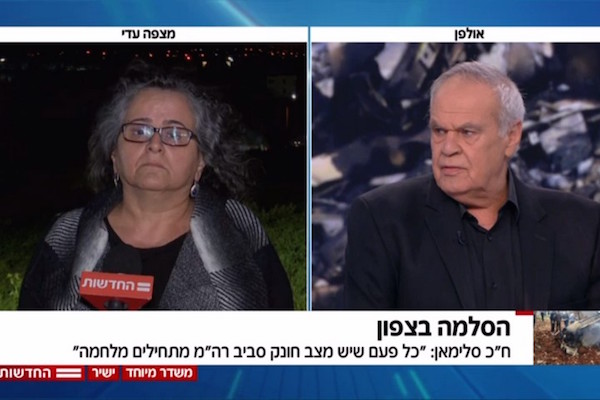MK Aida Touma-Suleiman, a female legislator from the Arab-Jewish socialist party, criticized the Israeli army’s policy toward Syria, warning that it could escalate to a war that would endanger civilians. In response, one veteran male television news analyst ordered her to ‘sit down and be quiet.’

The Israeli air force has carried out more than 100 bombing incursions deep inside Syrian territory over the past few years, with little acknowledgement from the Israeli media and without suffering any military or diplomatic repercussions. Meanwhile, Russia and Iran have deployed military forces in Syria, ostensibly to eliminate the Islamic State but in fact to increase their sphere of influence — at the cost of the starving Syrian people.
Israel did open a field hospital for wounded Syrians in the Golan, an act for which it sought — and received — substantial international media coverage that portrayed the country in a very positive light. But this act of magnanimity to Syrian civilians should not be used as a means of distracting attention from the fact that if the Assad regime, or the Russian and Iranian forces that are fighting to support it, had responded militarily to Israel’s many military sorties deep into Syrian territory, a war would have broken out long ago — with all the attendant, and very grave, consequences for civilians who live on both sides of the border.
Last week, this scenario nearly came to pass. The Israeli military downed an Iranian drone that penetrated Israeli air space from Syrian territory. Israel retaliated with an air sortie into Syria, which led to another retaliation from Syria, which shot down an Israeli fighter jet. Israelis were shocked, but they should not have been. This escalation has been heating up for a long time.
Now there are two wounded Israeli pilots and a destroyed fighter plane; and this stings Zionist pride, which has become accustomed to hearing about the heroic exploits of its powerful air force when it carries out strikes against enemies incapable of responding. The army did not even have time to prepare civilians for the long-simmering possibility of war.

The Knesset rushed to express its support for the government “during this difficult period.” Even Zehava Galon, the leader of the leftist Meretz party, tweeted her support for Netanyahu. Those who claimed Netanyahu wanted a war to distract the public from his legal troubles were, she wrote, indulging in conspiracy theories. Netanyahu was a cynic, but he wasn’t evil; he would not arrange for the downing of an Israeli fighter plane in order to divert public attention from his possible indictment on charges of corruption.
תיאוריות הקונספירציה שרצות עכשיו, לפיהן נתניהו מייצר מלחמה כדי להסיח את הדעת מחקירותיו, הן מופרכות ומיותרות. נתניהו ציניקן, אבל הוא לא דמות של נבל מקומיקס, והוא בטח שלא ארגן הפלת מטוס ישראלי רק כדי לדחות את המלצות המשטרה. הטענות האלה מעליבות ומקוממות
— זהבה גלאון (@zehavagalon) February 10, 2018
Aida Touma-Suleiman, a Member of Knesset for the Joint List, is the only public figure who has been saying what many concerned Arab and Jewish citizens are thinking. In a series of interviews, speaking in her sharp, articulate Hebrew, she said that Israel bore significant responsibility for the ongoing military escalation. Touma-Suleiman warned that Israel’s leaders were playing with fire and endangering us all. Both Arabs and Jews, she said, were afraid of a war that the government and army seemed to want.
What’s more upsetting to wounded national pride than a female Arab member of Knesset, who usually deals with women’s affairs, expressing criticism of the government regarding its military policy? During a live television broadcast Roni Daniel, Israel’s best known and most veteran military affairs reporter, who cites army communiques without criticism, ordered Touma Suleiman to “sit down and be quiet.”
Attila Somfalvi, a news presenter for the popular site Ynet, provided viewers with an even more dramatic performance. During an interview he pointed his finger at the camera and accused Touma-Suleiman of applauding in approval for Israel’s enemies and offering support to terrorist states. Somfalvi’s co-host, Alexandra Lukash, asked Touma-Suleiman why she had chosen to comment on national security issues instead of worrying about connecting Arab villages to water and electricity — as though Touma-Suleiman were the Minister of Infrastructure.
When mainstream Jewish-Israeli journalists are forced to engage with Arab legislators, they invariably stumble. Their reflex is to deny those elected Arab representatives legitimacy in the eyes of their own constituency, rather than to engage with their arguments. That is why Lukash asked Touma-Suleiman why she was commenting on Israel’s military policy toward Syria rather than worrying about the infrastructure needs of Israel’s Arab citizens.
Palestinian legislators are citizens of this state, composing 20 percent of the population, but in the majority-Zionist Knesset they are told to sit quietly and to refrain from expressing an opposing opinion on matters related to national security. Meanwhile the news presenters, the journalists, and the politicians continue to insist that “the Arabs” just want to destroy Israel, and that the Jewish state is a victim of aggression which stands alone in its yearning for peace and harmony in the Middle East.

